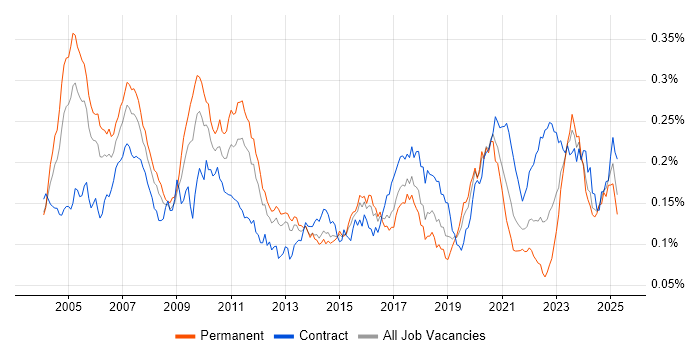Quant Developer
UK > England
The median Quant Developer salary in England is £140,000 per year, according to job vacancies posted during the 6 months leading to 6 May 2025.
The table below provides salary benchmarking and summary statistics, comparing them to the same period in the previous two years.
| 6 months to 6 May 2025 |
Same period 2024 | Same period 2023 | |
|---|---|---|---|
| Rank | 584 | 686 | 858 |
| Rank change year-on-year | +102 | +172 | +158 |
| Permanent jobs requiring a Quantitative Developer | 84 | 158 | 90 |
| As % of all permanent jobs advertised in England | 0.18% | 0.19% | 0.098% |
| As % of the Job Titles category | 0.20% | 0.20% | 0.11% |
| Number of salaries quoted | 45 | 111 | 76 |
| 10th Percentile | £87,500 | £97,500 | £77,500 |
| 25th Percentile | £100,000 | £100,000 | £97,500 |
| Median annual salary (50th Percentile) | £140,000 | £137,500 | £122,500 |
| Median % change year-on-year | +1.82% | +12.24% | +22.50% |
| 75th Percentile | £165,000 | £155,000 | £150,000 |
| 90th Percentile | £174,000 | £172,500 | £162,500 |
| UK median annual salary | £140,000 | £137,500 | £122,500 |
| % change year-on-year | +1.82% | +12.24% | +22.50% |
All Permanent IT Job Vacancies
England
For comparison with the information above, the following table provides summary statistics for all permanent IT job vacancies in England. Most job vacancies include a discernible job title that can be normalized. As such, the figures in the second row provide an indication of the number of permanent jobs in our overall sample.
| Permanent vacancies in England with a recognized job title | 42,728 | 80,514 | 84,327 |
| % of permanent jobs with a recognized job title | 90.43% | 94.48% | 91.53% |
| Number of salaries quoted | 24,644 | 60,209 | 53,453 |
| 10th Percentile | £30,000 | £28,500 | £32,500 |
| 25th Percentile | £42,415 | £38,125 | £45,000 |
| Median annual salary (50th Percentile) | £57,500 | £53,500 | £60,800 |
| Median % change year-on-year | +7.48% | -12.01% | +1.33% |
| 75th Percentile | £75,000 | £71,915 | £82,500 |
| 90th Percentile | £97,500 | £90,822 | £100,000 |
| UK median annual salary | £57,500 | £52,500 | £60,000 |
| % change year-on-year | +9.52% | -12.50% | - |
Quantitative Developer
Job Vacancy Trend in England
Job postings that featured Quantitative Developer in the job title as a proportion of all IT jobs advertised in England.

Quantitative Developer
Salary Trend in England
3-month moving average salary quoted in jobs citing Quantitative Developer in England.
Quantitative Developer
Salary Histogram in England
Salary distribution for jobs citing Quantitative Developer in England over the 6 months to 6 May 2025.
Quantitative Developer
Job Locations in England
The table below looks at the demand and provides a guide to the median salaries quoted in IT jobs citing Quantitative Developer within the England region over the 6 months to 6 May 2025. The 'Rank Change' column provides an indication of the change in demand within each location based on the same 6 month period last year.
| Location | Rank Change on Same Period Last Year |
Matching Permanent IT Job Ads |
Median Salary Past 6 Months |
Median Salary % Change on Same Period Last Year |
Live Jobs |
|---|---|---|---|---|---|
| London | +45 | 82 | £140,000 | +1.82% | 107 |
| North East | - | 2 | £100,000 | - | 3 |
| North of England | - | 2 | £100,000 | - | 5 |
| Quantitative Developer UK |
|||||
Quantitative Developer Skill Set
Top 30 Co-occurring Skills and Capabilities in England
For the 6 months to 6 May 2025, Quantitative Developer job roles required the following skills and capabilities in order of popularity. The figures indicate the absolute number co-occurrences and as a proportion of all permanent job ads across the England region featuring Quantitative Developer in the job title.
|
|
Quantitative Developer Skill Set
Co-occurring Skills and Capabilities in England by Category
The follow tables expand on the table above by listing co-occurrences grouped by category. The same employment type, locality and period is covered with up to 20 co-occurrences shown in each of the following categories:
|
|
|||||||||||||||||||||||||||||||||||||||||||||||||||||||||||||||||||||||||||||||||
|
|
|||||||||||||||||||||||||||||||||||||||||||||||||||||||||||||||||||||||||||||||||
|
|
|||||||||||||||||||||||||||||||||||||||||||||||||||||||||||||||||||||||||||||||||
|
|
|||||||||||||||||||||||||||||||||||||||||||||||||||||||||||||||||||||||||||||||||
|
|
|||||||||||||||||||||||||||||||||||||||||||||||||||||||||||||||||||||||||||||||||
|
|
|||||||||||||||||||||||||||||||||||||||||||||||||||||||||||||||||||||||||||||||||
|
|
|||||||||||||||||||||||||||||||||||||||||||||||||||||||||||||||||||||||||||||||||
|
||||||||||||||||||||||||||||||||||||||||||||||||||||||||||||||||||||||||||||||||||
